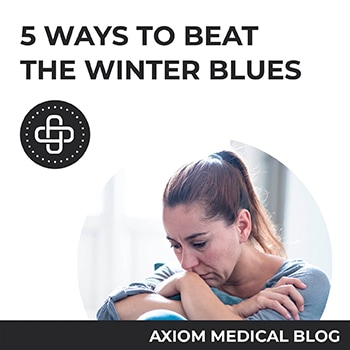Bright sunny days are over, and chilly gray days are here. Darker mornings, early sunset, and cooler temperatures mean winter is here, and the cold season brings back the winter blues. While there’s no clinical diagnosis for the “winter blues,” several health experts define winter blues as a relatively common seasonal disorder with typical signs ranging from sugar craving to lack of motivation and sleeping more than usual. Are you experiencing any of these symptoms? Here is a list of 5 ways to beat the winter blues effectively without drinking an extra glass of hot chocolate.

Why Do You Experience Winter Blues?
Even though there is no medical consensus as to why someone experiences winter blues, several theories point to one key factor: lack of daylight. Since natural sunlight can affect a person’s mood, daylight saving time change can lead to an imbalanced neurotransmitter level leading to winter blues
Here are a few mechanisms that support this theory.
Changed Neurotransmitter Level:
Experts support the theory of lack of sunlight affecting the hypothalamus, which, in turn, affects the secretion of neurotransmitters in brain cells. Since these chemicals brain cells use to communicate with each other, low neurotransmitter levels can lead to mood change, lack of motivation, and depression.
Low Serotonin and High Melatonin:
People experiencing winter blues typically have low serotonin levels (a feel-good hormone) and high melatonin levels (sleep hormone). Your brain cells produce more melatonin than serotonin because of the time changes, early sunset, and gloomy winter weather. These neurotransmitters are essential mood-defining hormones, which may make you feel motivated or leave you lethargic with winter blues.
Hereditary
Specific theories also suggest that genetic components can be a causing factor of seasonal blues since it often runs in families, especially those with a history of mental and behavioral health disorders, depression, or substance abuse. Interestingly, winter depression was a survival mechanism that helped our ancestors survive harsh cold winters. As per several theories, winter blues are similar to mammal hibernation to conserve energy during the darkest months.
Post-Holiday Depression:
Another primary reason for winter blues is post-holiday depression. With Thanksgiving holidays in late November and a long winter break from Christmas to New Year, many people take a break from their work schedule and spend more time with family, enjoy traveling, and indulge in festive eating and celebrations. It is not unusual to experience a post-holiday slump and mood swing leading to winter blues.
Typical Winter Blue Symptoms Include:
- Low energy
- Feeling sleepier than usual
- Unmotivated and bored
- Less interested in outdoor activities
- Mood swings
- Overeating
Winter Blues vs. Seasonal Affective Disorder
While winter blues and seasonal affective disorder have many similarities with the main difference being the severity of symptoms. While the winter blues can be compared to a “sad” state of mind, the seasonal affective disorder is a form of “depression.”
Winter Blues
- Sadness during the colder winter months
- Feeling sleepy and lethargic
- Lack of motivation
SAD – Seasonal Affective Disorder
- Feeling sad and depressed during the fall and winter months
- Frequent sleep and eating disorder
- Unable to function normally
- Lack of motivation
5 Ways to Beat Winter Blues:
Keep your fitness game intact:
Winter or summer, working out always helps with staying healthy and motivated. Endorphin, dopamine, and serotonin levels are high when you work out every day. These brain transmitters always help with mood-lifting and feeling good.
Don’t forget your hobbies:
Although winter months limit your outdoor activities, you can always engage in hobbies. Painting, reading a book, craft making, and board games are some of the best activities to enjoy with your family.
Utilize your holiday time:
Another way of beating the winter blues is to help someone in need during holiday time. Participate in your local church activities or charity work and see how such activities positively impact your mood.
Improve your diet:
Eating healthy will always keep your energy levels up. Pay close attention to what do you eat during the holiday time and improve your diet by adding more nourishing meals.
Take vitamin D:
Low vitamin D can lead to a lack of energy and stressful life. A drop in vitamin D is possible because of darker winter days and fewer outdoor activities. Consult with your physician and take vitamin D supplements if needed.
Learn more about winter blues and SAD from our healthcare experts. Join us for a FREE webinar on this topic.
Is The Winter Blues Real? Understanding and Managing Seasonal Affective Disorder – Register Now!
Axiom Medical Can Help!
OSHA’s new Emergency Temporary Standard mandates workplace vaccination and testing for the unvaccinated. Let your employees return to work with confidence with Axiom Medical’s support and population health expertise. Our OSHA COVID-19 Compliance program offers all the features you need to comply with the OSHA 2.0 Emergency Temporary Standard.










